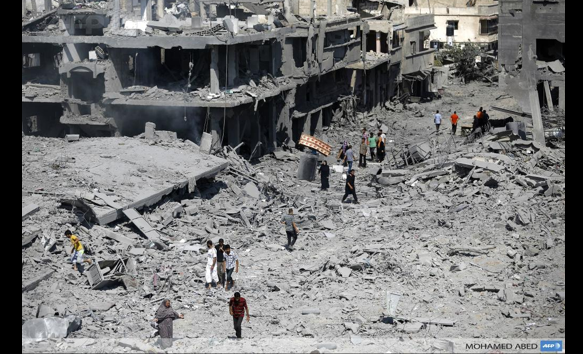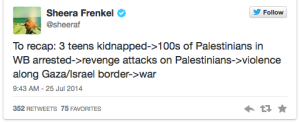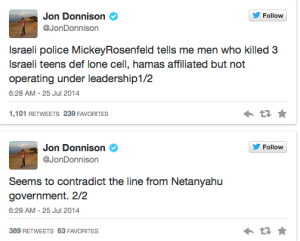At around noon on March 20 last year, Air Force One landed at Tel Aviv’s Ben Gurion Airport for Barack Obama’s first presidential visit to Israel.
The three-day trip had been billed as an Israeli reset—the newly reelected president’s bid for a clean slate with the Jewish state after four years of icy relations. Obama would lay a wreath at the tomb of Theodor Herzl, the father of Zionism. He would visit the Yad Vashem Holocaust Museum. He would address an auditorium packed with Israeli students. And, of course, he would meet with Israeli Prime Minister Benjamin Netanyahu.
Before heading to Netanyahu’s office, however, the presidential motorcade took Obama to see his favorite Israeli: the country’s dovish 89-year-old president, Shimon Peres. As Obama stepped out of his car in front of Peres’s Jerusalem residence, he was greeted with a red carpet, along which a line of children stood waving Israeli and American flags and singing, “Heveinu Shalom Aleichem” (“We Have Brought Peace Upon You”). Inside, at a podium, Obama and Peres praised each other before a swarm of TV cameras. Later, in the presidential garden, they took turns shoveling dirt for a tree planted in Obama’s honor. And in the middle of it all, the two ditched the crowd for a meeting in Peres’s office. Four people joined: two Peres aides, National Security Advisor Tom Donilon, and new Secretary of State John Kerry.
“I want to focus on the peace process,” Obama told Peres as they sat down. “No one in the world understands it better than you.” Both presidents were firm believers in the two-state solution. And in pursuit of that vision, both had invested hope in Netanyahu, only to find themselves jaded. In 2011, Peres had conducted top-secret peace negotiations with Palestinian President Mahmoud Abbas on the prime minister’s behalf, but called them off when Netanyahu’s backing wavered. Obama’s tensions with Netanyahu, meanwhile, had become fodder for Israeli comedians. After years of failing to get the parties back to the negotiating table, Obama had reportedly given up on a peace deal. But he brought a different message to Peres that day: “Everywhere I go in the world, people talk about it,” he said. “The international community waited for the U.S. elections to be over, and then the elections in Israel—and now it’s expecting us to lead an effort towards peace. I want to go for it.”
READ: Israel’s Deadly Invasion of Gaza Is Morally Justified
Fortunately for Obama, “going for it” would require little time and political capital. In Kerry, he had someone eager to expend his own. Kerry recognized the foibles of Abbas and Netanyahu, but also their merits. In the former, Kerry saw a leader well ahead of his public on the subject of peace with Israel—and who, at age 77, might not be around much longer. And in the latter, he saw an uncontested prime minister, who, if only persuaded to make the tough compromises most of his countrymen were prepared to accept, could shepherd a deal through the landmines of Israeli politics. Above all, in the weeks since assuming office, Kerry had become convinced that the parties didn’t have much longer to craft a two-state solution. As he would say at a House hearing the following month: “I think we have some period of time—in one to one-and-a-half to two years—or it’s over.”
Back at Peres’s office, the Israeli president saluted Obama and Kerry for taking on the decades-old conflict. He had known almost every president and secretary of state since John F. Kennedy. And he had seen most of them parachute into the world of Middle East peacemaking, only to walk away frustrated and empty-handed. But he shared Kerry’s sense of urgency—and, strangely, his optimism. He told Obama that Abbas remained “the best peace partner Israel could hope for” and that Israel’s recent elections—which had forced the right-wing Netanyahu into a more centrist coalition—presented an opportunity that shouldn’t be missed.
“I’m glad you think so,” Obama said. “John is going to be here a lot over the next few months.”
II.
On the night of July 18 last year, after months of talks with John Kerry, Mahmoud Abbas convened a meeting of the Palestinian leadership at his presidential compound in Ramallah (the “muqata”). As the dozens of officials took their seats around a long u-shaped table, beneath a panorama of the Jerusalem skyline, the Palestinian president shuffled his notes and looked out at his comrades, more nervously than usual. He was about to make the toughest sell of his political life.
Over his five decades in the Palestinian Fatah movement, Abbas (or Abu Mazen, as he’s popularly known) had grown accustomed to staking out positions on Israel that put him in the minority. He pushed secret talks with Israelis in the 1970s, advocated recognizing Israel and forswearing violence in the 1980s, and questioned the wisdom of the second intifada in the 2000s. Elected president of the Palestinian Authority in 2005 following Yasir Arafat’s death, Abbas had campaigned on creating a Palestinian state through negotiations. But over and over, outside factors got in the way. A 2006 Hamas election victory and 2007 Gaza coup left Abbas in control of just the West Bank, and 2008 talks with Israel were short-circuited by Israeli Prime Minister Ehud Olmert’s corruption indictment and Netanyahu’s subsequent election. As of 2013, Abbas’s proudest achievement was the U.N.’s recognition of Palestine as a “non-member observer state”—a status with no practical significance. As one senior Palestinian official put it, “It’s bullshit, and we know it’s bullshit.”
Like his presidency, Abbas’s negotiations with Kerry over the renewal of direct talks with Israel had been a series of letdowns. He demanded a total Israeli settlement freeze; Kerry said he could get him only a “major slowdown.” He asked that talks be based on the 1967 lines, the frontiers that existed before Israel gained control of the West Bank; Kerry offered merely a letter endorsing that position. He requested the release of 104 Palestinians imprisoned before the 1993 Oslo Accords; Kerry said he’d do his best. And yet, as Abbas began his statement to the leadership that night, he argued that the Palestinians should resume negotiations. “I know this deal isn’t perfect,” he said, “but I want to give it a chance. John Kerry is prepared to invest a serious effort.”
When Abbas finished his remarks after 20 minutes, officials who wanted to respond raised their hands. Abbas wrote down their names and called on them in turn. One by one, the officials spoke. And one by one, they came out against the Kerry proposal. They grilled Abbas on the details—What would the American letter say? What sort of settlement slowdown?—and the Palestinian leader answered as encouragingly as he could. “I’ve never seen him try to convince us so hard that something is the right decision,” said Hanan Ashrawi, one of the skeptics. Ashrawi respected Kerry’s tenacity—he reminded her of James Baker, the Bush 41 secretary of state who first coaxed Arab and Israeli officials into the same room—but she and the others around the table believed there was zero chance for a deal with a right-wing ideologue like Netanyahu. They reminded Abbas that resuming talks without a settlement freeze would come at great political cost. You can’t afford this, they told him. The street won’t stand for it. When Abbas called on Ashrawi, she urged him to go back to Kerry and tell him he needed more. Abbas threw up his hands. “I have exhausted my time with John Kerry,” he said. “This is it.”
One person conspicuously silent at the meeting was Saeb Erekat. He was a political Swiss Army Knife—chief negotiator with the Israelis, chief ambassador to the Americans, chief international media spokesman, and right-hand man to Abbas. He had one critical flaw, though: He never knew when to shut up. “Saeb is capable of being very charming and funny,” said an American official, “but also of being incredibly full of it.” As the other Palestinians spoke against negotiations, Erekat debated whether to join them. If I do, I’d be obliged to resign, he thought. When Abbas solicited his opinion, Erekat replied sheepishly, “I will respect the decisions taken by the leadership.”
Abbas adjourned the meeting at around 12:30 a.m., without a final decision. As officials were leaving the room, he leaned over to Erekat. “Let’s talk alone in a few minutes,” he said. Erekat then took out his iPhone and called Palestinian intelligence chief Majid Faraj. “Come right away,” he said. Abbas and Erekat walked down the hall to the president’s office and sat in a pair of leather chairs. Abbas looked Erekat in the eye. “You’re against me,” he said. Erekat was taken aback by the comment. “I’m not against you,” he replied. “I just think Netanyahu will take you, Kerry, and everyone else for a ride.” Erekat’s reasons for opposing the talks were partly selfish. As chief negotiator, he would pay the highest political price when the process inevitably collapsed. But he believed (and Faraj, who arrived immediately, agreed) that, if the Palestinians were going to enter futile talks, they should get something tangible to show for it.
Together, Erekat and Faraj brought up the Palestinian campaign for U.N. recognition, which Abbas was planning to expand in two months against Israel’s wishes. Kerry had repeatedly pleaded with Abbas not to apply for membership in any new U.N. agencies. “I can’t have negotiations going on with this sword over my neck,” he said. Time and again, the Palestinian leader refused. Having ruled out a third intifada, Abbas believed the United Nations was his only leverage over Israel. Erekat and Faraj agreed. But they suggested that Abbas try trading it for something more valuable: the 104 pre-Oslo prisoners. Abbas initially balked, but after more than an hour of back and forth—it was now nearly two o’clock in the morning—he came around. He reached into his suit pocket and took out one of the index cards that he often carried with him to take notes. He scribbled on it—“104 prisoners for no-UN”—and authorized Erekat to present the offer to Kerry the following morning in Amman. “And tell him to give me that letter,” Abbas added.
Ashrawi and the other Palestinian officials went home that night believing that nothing would be decided for a few weeks, at least until they had been asked to vote on a concrete proposal. But at around eight the following night, their phones lit up. “Turn on the television!” one screamed at another. On the screen was John Kerry, announcing the resumption of Israeli-Palestinian negotiations. “We hit the roof,” Ashrawi said.
Benjamin Netanyahu and John Kerry first met each other in the mid-’70s, in Boston, when Netanyahu (better known as Bibi) worked there as a management consultant. Years later, during Kerry’s frequent trips to Israel as a senator, the two would typically get together for catch-up dinners; it never seemed to bother them that their politics were so different. “There’s a sense [on Netanyahu’s part] that Kerry has an emotional commitment to Israel,” said Israeli Ambassador to the United States and longtime Bibi confidante Ron Dermer.
The morning after the Palestinian leadership meeting, Kerry called his old friend from his suite at the Amman Sheraton. He relayed the previous night’s events, and then Erekat’s offer. Kerry told the prime minister he needed to fly back to Washington that night—his wife, Teresa, was recovering from a medical procedure—so he would need an answer soon. It was clear that, after his five trips over four months, the fate of his initiative rested with Netanyahu.
Since reclaiming the premiership in 2009 after a disastrous stint in the 1990s, Netanyahu felt as if nobody had given him proper credit for the risks he had taken for peace. In 2009, he had endorsed the two-state solution in a landmark speech at Israel’s most right-wing university. A few months later, he imposed an unprecedented ten-month settlement moratorium. Now Netanyahu was being asked to free 104 convicted murderers just to sit down with Abbas. And Abbas was being asked to do … what, exactly?
When Kerry had first raised the prisoner issue in June, Netanyahu was adamant. “I can’t get that through my Cabinet,” he said. His right-wing Likud Party would never stand for it. Neither would the more hard-line Jewish Home Party. It wasn’t even certain that the coalition’s two centrist parties would. Around that time, Netanyahu had called dovish former intelligence chief Jacob Perry, now a government minister. Though Perry was not opposed to freeing prisoners in principle, he thought that there were fundamental problems with Abbas’s list. More than 20 of the 104 held either Israeli citizenship or residency; were Israel to release them, Perry believed, it would send a dangerous signal. That issue aside, at least ten of the names were immediately deemed “out of the question.” When Perry learned that the list included a militant kingpin he had hunted personally, he lost his temper. “Over my dead body!” he shouted.
But by the time Netanyahu received the call from Kerry, circumstances had changed. Three days earlier, the Israeli newspaper Ha’aretz had reported that the European Union would soon restrict its institutions from doing business with Israeli entities that operated beyond the 1967 lines. To Netanyahu, the timing couldn’t have been worse. “If I accept Palestinian preconditions now,” he said in a conversation the day of the news, “it will look like I caved into European pressure.” But the premier also believed the new rules were a harbinger of the broader boycotts and sanctions that awaited Israel if it were blamed for blocking new peace talks.
After consulting his coalition partners, Netanyahu called Kerry back a few hours later and told him that he could accept the deal—with some conditions. First, the prisoners would need to be released in four tranches over the talks’ nine-month timeline. Netanyahu didn’t want Abbas to pocket the prisoners, then quit the process two months in. Netanyahu also told Kerry he would have to approve some new settlement units to keep his coalition intact. When Kerry asked how many, Netanyahu indicated that it would be more than 2,000. Kerry considered this for a moment. Since Obama’s 2009 Cairo speech, the United States had maintained a policy of “not accept[ing] the legitimacy of continued Israeli settlement activity.” But in the context of seeking a conflict-ending deal that would resolve the settlement issue once and for all, adding 2,000-odd units to the more than 100,000 that already existed seemed tolerable. Kerry told Netanyahu that U.S. policy would not change, but that he understood.
In his rush to announce the resumption of talks before flying home, though, Kerry left the conversation with two serious misunderstandings that would sow the seeds for later surprises. Netanyahu’s 2,000-plus figure covered only homes that were open for bidding. (In his mind, long-term building plans were a different story.) Nor did it include East Jerusalem, a part of the West Bank that Israel considered sovereign territory. Focused on the big picture, Kerry hadn’t asked for such clarifications.
The more consequential miscommunication concerned the prisoners. Netanyahu told Kerry that he was prepared to release approximately 80 of them (excluding those with Israeli identity cards). Kerry asked for—and thought he heard Netanyahu agree to—all 104. “Both of them like to talk for long periods of time,” said someone who has dealt with both leaders. “And I’m not sure that when one of them is lecturing the other at length, the other guy is really listening very carefully.”
The following nine days leading up to the Cabinet vote on the prisoners were hectic for Bibi. He needled undecided Likud ministers and wrote a public letter to the Israeli people asking for their support. His team was also busy renegotiating with Kerry’s team to paper over their misunderstanding. (The Israelis decided that the fourth tranche of prisoners, which included all the Israeli Arabs, would require a separate vote.) The night before the Cabinet meeting, passage was still in doubt, but after an emotional debate on July 28, the measure passed 13 to seven. In the opposition, some left-wing Knesset members (MKs) who believed Netanyahu would never make peace began to question whether he had changed. “I take my hat off to you as a leader,” one dovish MK wrote to him in a personal letter.
Abbas was more cynical. He still doubted that Netanyahu was prepared to make the concessions necessary for peace and feared that the Americans would ultimately shortchange the Palestinians. One day after the Israeli vote, though, Kerry sent Abbas the letter he had been seeking, promising otherwise. “Dear Mr. President,” it read. “In response to your question regarding our position on the issue of borders, this letter is to confirm that the position set forth by President Obama in his May 2011 speeches, that Palestine’s borders with Israel should be based on the 1967 lines with mutually agreed swaps, still represents our position. As negotiations begin, I reiterate our commitment to this position. As you confirmed, this letter is and will remain private and confidential between you and me.”
Against all odds, Kerry had managed to strike two separate deals with Abbas and Netanyahu. He now had nine months to get them to make one with each other.
III.
Two days after the Israeli Cabinet vote, Tzipi Livni walked into the White House. It wasn’t her first visit. As Israel’s foreign minister from 2006 to 2009, she had been a Bush administration favorite. Here, as Israel’s chief negotiator, she looked around the Oval Office and saw a new set of faces: Obama, Kerry, Joe Biden, National Security Advisor Susan Rice, Martin Indyk (Kerry’s envoy to the talks), and the three other members of the Israeli and Palestinian negotiating teams. Months earlier, Livni had campaigned on the idea that Israeli-Palestinian peace was possible; voters awarded her with a seventh-place finish. Now she was getting the chance to prove them wrong.
Livni has always been an unlikely leader of Israel’s peace camp. Her parents met while serving in the Irgun, the pre-Israel right-wing paramilitary group, and she herself had entered politics through Likud. But while representing Israel in the 2008 negotiations, she earned the other side’s respect. “She has very good intentions,” said former Palestinian Prime Minister Ahmed Qurei, who was her counterpart at the time. “When we were negotiating, she would always ask me questions: ‘Why is this thing important to you, and the other not?’ She really tries to understand the Palestinian position.’”
Of all the Palestinian negotiators, few had gotten along better with Livni than the one who now sat opposite her: Erekat. “I have no doubt that, if you put Tzipi and Saeb in a room alone, you will have a deal in two weeks,” said a senior Israeli minister. Of course, they would not be alone. At every step in the process, Erekat would be joined by an ambitious Fatah apparatchik named Mohammed Shtayyeh, and often by Faraj, the intelligence chief, as well. Livni would be negotiating under the watchful eye of Netanyahu’s personal attorney, Itzik Molho.
In the Oval Office, Obama went around the room, giving each negotiator a chance to speak. Erekat repeated his adage that “nobody stands to gain more from the success of these talks than the Palestinians, and nobody stands to lose more if they fail.” Livni grimaced—she had heard the line a thousand times. When her turn came, she offered a warning that would prove as true as it was predictable. “There will be distractions along the way—violence, settlements—but it’s very important that we not let it distract us from the goal of reaching a deal,” she told Obama. The president listened warily to the negotiators. “There’s a lot of optimism in this room,” he said. “I’m more skeptical.” He turned to Kerry and said, jokingly, “John, don’t get their hopes up.” But Obama wasn’t entirely negative. “Make no mistake,” he continued, “if you actually do reach an agreement, I will be there to support you so that it’s implemented and no force on Earth could stop it.”
The first negotiating session took place two weeks later at a Jerusalem think tank. Erekat arrived by cab—Israeli security wouldn’t let him drive himself—and the squabbling began almost immediately. The Israeli team had brought a camera crew to film the negotiators shaking hands. But Shtayyeh refused to participate in the spectacle. When Erekat suggested to Livni that the handshake be between just them—the delegation heads—Molho protested that he needed to be included. Still, both sides walked away from the meeting satisfied: Livni and Molho because the Palestinians had reaffirmed their desire to end the conflict, Erekat and Shtayyeh because the Israelis had agreed that all issues would be on the table. “It was very professional,” said Shtayyeh.
The weekly meetings, conducted in English, were tense at times, but lighthearted at others. During one session at Erekat’s house in Jericho, when the sides discussed the Jordan Valley area, Livni quipped that, due to a series of recent earthquakes in Israel, there was no point debating the issue because future tremors would redraw the map anyway.
But the bonhomie soon faded. On August 26, hours before a subsequent meeting, Israeli forces shot three young Palestinians during an arrest raid. Around the same time, renewed Palestinian attacks killed three Israelis. Later, other deadly incidents claimed four more Palestinian lives. Shtayyeh believed that someone in the Israeli army chain of command was trying to sabotage the talks. He told Erekat, “Let’s stop this madness and save Palestinian lives.”
The Israeli team, for its part, was deeply divided, with Livni keen to discuss details and Molho filibustering over procedural matters. Molho—whom some of the Americans dubbed “Dr. No”—was particularly insistent that Israel never place any map on the table until the security conditions that would govern a Palestinian state were agreed upon. At one meeting, after he went to the bathroom, Indyk pulled out a map of Israeli settlements to facilitate a discussion about borders. When Molho returned, he became visibly unnerved, trying to figure out what Livni had said in his absence. “I go to the bathroom for five minutes and there are suddenly maps?” he groused. Erekat rolled his eyes. “God forbid she might strike a deal,” he said later.
The formal negotiations, however, had always been secondary. They helped define the gaps between the two sides, but they couldn’t close them. That would take the leaders themselves. The Americans, who assumed that Abbas was already prepared to make far-reaching concessions, believed that progress hinged on Netanyahu. And yet as of October, they didn’t know what he thought about most of the core issues. While the prime minister seemed, at least rhetorically, to be keeping his options open—vows to keep Jerusalem united had disappeared from his speeches—he had been careful not to divulge specifics, even to Kerry. “With Bibi, you sometimes get upbeat not because of what you’re hearing, but because of what you’re not hearing,” said a veteran American official. “I sometimes tell myself, ‘God, we’re analyzing what this guy isn’t saying.’”
To satisfy his curiosity, Kerry invited Netanyahu for a tête-à-tête in Rome at the residence of the American ambassador, Kerry’s old Yale roommate. The meeting was called for October 23, two days after Netanyahu’s sixty-fourth birthday, and only a handful of senior officials on each side were allowed to attend. After arriving at the palatial château in the afternoon, Kerry and Netanyahu went out to a bench in the outdoor atrium so the prime minister could smoke a cigar while they talked. At different points over the coming hours, various aides would be called in for discussions of discrete issues. At one point, the Americans brought out a birthday cake and everyone sang “Happy Birthday” to Bibi.
But for six of the seven hours, the meeting was “four eyes,” leaving the aides with nothing to do but drink vast quantities of Diet Coke and putter around. Two officials, an American and an Israeli, tweeted out a double selfie. Frank Lowenstein, a senior Kerry aide, kept looking at his watch as the hours passed. What on Earth are they talking about? he wondered.But when Kerry emerged and took his aides to dinner, he spoke only in generalities. He then navigated the alleys of Rome on the way to his favorite gelato establishment.
Two weeks later, the Israeli and Palestinian negotiators met at a hotel west of Jerusalem. Both sides showed up angry. Erekat and Shtayyeh were steaming at new Israeli settlement plans that had been announced immediately after the second prisoner release days earlier, and at Netanyahu’s (false) claim in an interview that Abbas had accepted the new building in return for the prisoners. Meanwhile, Livni and Molho, who had adhered rigorously to Kerry’s gag order on the talks, were incensed by a slew of Palestinian news stories that they believed their counterparts had leaked. Both sides, excepting Molho, were frustrated at the lack of progress they’d made over three months. And the claustrophobic setting—a small bedroom that had been converted into a conference room—didn’t help to calm nerves.
Erekat stormed into the room and slammed his briefcase on the table. In recent weeks, with the talks faltering, he had begun drafting a Palestinian Plan B that would include ending Fatah’s six-year-old rift with Hamas and resuming the U.N. campaign—steps that would doom the process. Pointing at the briefcase, he declared: “This case contains our requests to join fifteen U.N. treaties and conventions, and my president will get my suggestion that he should sign them immediately if you say it was prisoners for settlements. And if he doesn’t approve it, I will resign tonight.”
“You can’t do this,” Livni said, raising her voice. “This is not what we agreed on.”
“What we agreed on was prisoners for no-U.N., not prisoners for settlements,” he barked.
“Stop shouting,” Livni said. “You’re being unfair.” But Erekat kept yelling that the settlements were making him a pariah among his people.
Saul Loeb/AFP/Getty Images
Barack Obama gets a high-profile tour of the Yad Vashem Holocaust Museum in Jerusalem this March.
As Livni listened to Erekat complain about his political problems, something inside her snapped. “Do you think this is easy for me?” she shouted. She recited a litany of some of the worst Palestinian prisoners that Israel was releasing for the sake of the talks: one who had murdered an elderly Holocaust survivor, another who had stabbed two teenagers, yet another who had hurled a firebomb at a bus, killing a mother and her children. “These are your heroes,” she said, disdainfully. “I don’t know why they are your heroes, but I pushed to release them to get these talks started so we could get a peace deal, so if I can do it, you can accept a few houses. Houses can be demolished. We can’t put those murderers back in jail, and I can’t get back three lives that were just taken.”
Erekat shot back: “What should I tell all the Palestinians who were killed?”
Finally, Indyk intervened, waving his arms like a baseball umpire making the safe sign. “Time out!” he screamed. The Palestinian negotiators went out to a nearby veranda, and minutes later, Indyk—whom Kerry had dubbed “the Saeb whisperer”—joined them. “I can’t take it anymore,” Erekat told Indyk. “It’s time for me to move on. Netanyahu is cheating us. He is not a man of peace.”
It was a refrain Indyk had grown accustomed to hearing. “I can tell you that he’s changing,” he said. “He’s moving.” After a few minutes, Indyk and the Palestinians returned to the room, and the meeting resumed, awkwardly. When they parted after three hours, the negotiators shook hands, as they had always done. But it was clear something had changed. That night, Erekat and Shtayyeh presented a joint letter of resignation to Abbas, while Livni called her top aides to vent. “I was one hundred percent sure it was over,” said one.
IV.
A few days after the shouting match, Kerry came to see Netanyahu at his office in Jerusalem. The Israeli premier was feeling alone, angry, and besieged. Tea Party types were continuing their slow-motion takeover of the Likud, weakening his position domestically. Even worse, the Iranians were on the cusp of a nuclear agreement with the world powers that would give them sanctions relief without requiring them to dismantle a single centrifuge (“the deal of the century,” Netanyahu called it). And then there was Kerry, who had the gall days earlier to suggest in an interview that Israel risked a third intifada if the peace process fell apart.
The prime minister opened the meeting by playing Kerry a video on one of his favorite topics: Palestinian incitement. It showed Palestinian children in Gaza being taught to glorify martyrdom and seek Israel’s destruction. “This is the true obstacle to peace,” Netanyahu told Kerry.
“It’s a major issue,” Kerry replied. “And nothing justifies incitement. I hate it. I’ve read Abbas the riot act about it. You know I have. But it is worthwhile to try to understand what life looks like from the Palestinian point of view.”
“This has nothing to do with the occupation and the settlements,” Netanyahu said.
Kerry pressed on: “When I fought in Vietnam, I used to look at the faces of the local population and the looks they gave us. I’ll never forget it. It gave me clarity that we saw the situation in completely different ways.”
“This isn’t Vietnam!” Netanyahu shouted. “No one understands Israel but Israel.”
Kerry tried explaining himself again: “No one is saying it’s Vietnam. But I’ve been coming here for thirty years, and I’m telling you, what’s building up in the Palestinians has only gotten worse. I’ve seen it. It doesn’t matter if it’s right or wrong; it just is. It can’t be solved if you can’t see it how they see it.”
By that time, it was becoming clear that a comprehensive peace treaty would be impossible before the talks’ April 29 deadline. But Kerry had a backup plan. He would get the sides to accept a U.S. “framework for negotiations”—a document spelling out parameters on all core issues—then push for a full deal with a new deadline. The good news was that, after previous rounds of talks and model treaties like the 2003 Geneva Initiative, the principles of any plausible Israeli-Palestinian deal—a demilitarized Palestinian state, borders based on the 1967 lines, a shared Jerusalem, and no mass return of Palestinian refugees to Israel—were known. The bad news was that neither leader supported them all publicly, and Netanyahu had built his political career opposing many of them. To assuage Bibi, Kerry decided to begin the framework talks on security. If the United States could put together a package that would satisfy Netanyahu on his flagship issue, the reasoning went, it might compel him to show flexibility on the others. To this end, Kerry recruited John Allen, a former commander of U.S. forces in Afghanistan, to craft a plan that would guarantee Israel’s security after a peace deal.
Much of Allen’s work would revolve around the contentious Jordan Valley, the swath of West Bank land abutting Jordan. Netanyahu wanted to keep a long-term Israeli force there to prevent the smuggling of terrorists and weapons, while Abbas was demanding a full Israeli withdrawal within three years. In freewheeling sessions at Jerusalem’s David Citadel Hotel, overlooking the basilicas of the Old City’s Christian quarter, Kerry would take off his jacket and challenge his team to brainstorm ideas that could square the two sides’ needs. (The Kerry team spoke more carefully over cell phones, believing the Israelis might be listening.) “Guys,” Kerry said, “Bibi has said a million times that he’s not going to accept an international force. So we need to think creatively.” One person noted that Abbas was open to an American force. “No,” Kerry said, “Bibi will say that he doesn’t want American guys getting shot at defending Israel.” Every conceivable idea was discussed, and Kerry—a former college debate champion—raised every conceivable Netanyahu objection.
In early December, Kerry presented Allen’s proposals to the Israelis. While they sidestepped the question of when Israeli forces would leave the Jordan Valley, they sketched out what the area—and the rest of the West Bank—might look like after they did. The future Palestinian-Jordanian border would include new early warning infrastructure, an invisible Israeli presence (via cameras) at border crossings, and top-shelf American gadgetry. Livni liked the package. So did most of Israel’s security brass. Even hard-line Foreign Minister Avigdor Lieberman was making conciliatory noises. “Israel will not get more than it is getting from Kerry,” he said publicly. Netanyahu saw it as a basis for discussion.
Netanyahu’s hawkish defense minister—Likud’s Moshe Ya’alon—thought it was worthless. “The Americans think we are natives who will be impressed with their technology,” he told one confidant. “Don’t they know that we are the masters of technology?” Unfortunately for everyone involved, it was impossible to imagine the Israeli government approving any deal without Ya’alon’s support.
For months, the Americans had courted the crusty defense minister and concluded that he was—in the words of one senior official—“beyond repair.” Ya’alon, meanwhile, railed about American naïveté in off-the-record briefings with journalists. On January 14, an Israeli newspaper published some of his remarks, including his diagnosis of Kerry as “obsessive” and “messianic.” “The only thing that can save us,” Ya’alon said, “is for John Kerry to win his Nobel Prize and leave us alone.”
Reuters/Jonathan Ernst
Kerry with the dueling negotiators, Tzipi Livni and Saeb Erekat, right behind him.
As Netanyahu kept one eye on his negotiations with the Americans during December and January, he was keeping another on his coalition. Right-wing parties had toppled his first government in 1999 over his actions in the peace process, and he wasn’t eager to relive the experience.
The primary source of Netanyahu’s heartburn was Naftali Bennett, the ambitious leader of the Jewish Home Party. In 2006, when Netanyahu was the leader of the opposition, Bennett began working as Netanyahu’s chief of staff, only to be fired after repeatedly clashing with Bibi’s wife. Now, Bennett was acting like the coalition partner from hell. Whatever Netanyahu said or did, Bennett—determined to supplant the prime minister as leader of the right—would try painting it as further evidence that he had abandoned his values.
Speaking at Davos on January 24, Netanyahu said something that should have appeased his base: “I do not intend to evacuate any settlements or uproot a single Israeli.” But the comment’s Talmudic interpretation became clear two days later, when officials from Netanyahu’s office explained that he thought Israeli settlers should be permitted to remain in the West Bank under Palestinian sovereignty following a peace deal. Bennett saw a window of attack and issued a statement the following day accusing Netanyahu of “ethical befuddlement.”
“Two thousand years of longing for the Land of Israel did not pass so we could live under the rule of Abu Mazen,” he declared. The comment went unanswered, and the next day, aboard a plane bound for a Holocaust ceremony in Poland with other Israeli MKs, Bennett and his allies traded wisecracks about Netanyahu, riffing on how they had spooked the prime minister into silence. “Everyone could hear them,” said one MK.
Bennett kept on attacking upon his return from Poland. “You know why Jews can’t live under Palestinian sovereignty?” he said in a speech. “Because they’ll be killed!” The morning after that quip, Housing Minister Uri Ariel—the second-ranking member of Bennett’s bloc—got a call from a senior Netanyahu aide, who asked him to convey a message from the prime minister: Bennett had until ten o’clock on Sunday morning (it was then Wednesday) to apologize for his attacks, or he would be fired. Minutes later, Netanyahu’s ultimatum was Israel’s top news story.
While the loss of Jewish Home’s twelve MKs would leave Netanyahu five short of a majority—and therefore at risk of new elections—the prime minister seemed positively blasé. In leaked conversations from that day, officials in his office said they had “other options,” an apparent reference to the 15-MK Labor Party. Swapping Jewish Home for Labor would be an incredible gamble for the notoriously risk-averse prime minister. It would put him at the head of a coalition dominated by doves, who could then bring down his government if he was not flexible in the talks.
But if Netanyahu was preparing a coalition shakeup, nobody from his office had informed Labor leader Isaac Herzog. Is Bibi bluffing? Herzog wondered as he read the “other options” quote. He called Aryeh Deri, leader of the ultra-Orthodox Shas Party (Netanyahu’s only other numerical route to a Bennett-less majority). “I haven’t heard from him, either,” Deri said. That day at the Knesset, Livni cornered Herzog in the hall and pressed him to join the government immediately. “We can’t waste any time,” she said.
Herzog resisted. “What’s the rush?” he said. “Let’s see what the Americans produce.”
While Livni and Herzog were talking, Bennett walked by. He stopped and looked the two over. “I see you’re already replacing me,” he said.
On the hard right, settler leaders and ministers were in a panic—a Palestinian state was about to be born because of a personal feud! Ariel urged Bennett to apologize. “This issue isn’t worth the fight,” he told him. “There are more urgent things to worry about: a settlement freeze, more prisoner releases.” Bennett, realizing that he had gone too far, backtracked that evening. “If the prime minister was hurt, that wasn’t my intention,” he said in a statement. Netanyahu agreed to accept the half-apology and move on, certain that another confrontation was only a matter of time.
Netanyahu had not become a peacenik overnight, but he understood that the status quo was not sustainable, that it put Israel in jeopardy of becoming a binational state. So he decided to go along with Kerry—objecting where he could, caving where he had no choice. By the end of January, in regular videoconferences and phone calls, Netanyahu and Kerry had moved well past security and on to borders and other issues. In the event of a framework, the prime minister would be permitted to express general reservations—but not on any particular issue—so he was intent on ensuring that he could live with every clause, however distasteful. Right-wing politicians, who had always been suspicious of Netanyahu, were becoming increasingly paranoid that something was being cooked up behind their backs, and those on the left were starting to express guarded hope. Nobody knew quite what to believe.
In December, Finance Minister Yair Lapid had asked Netanyahu what the odds were for achieving a framework. He was surprised at Netanyahu’s relative optimism. “Forty–sixty,” the prime minister had said. Following the Bennett fiasco, Lapid asked again. After a moment’s pause, the answer came back: “Sixty–forty.”
V.
By late January, the Americans believed that their strategy of patient engagement with Netanyahu was finally paying off. After months of painstaking negotiations over every word in the framework, the prime minister had accepted once-unthinkable language. On refugees, the document would promise monetary compensation to Palestinians displaced in Israel’s War of Independence (and, separately, to Jews who left their homes in the Arab world). It also stated clearly that “the Palestinian refugee problem” would be solved within the new Palestinian state. But, in a groundbreaking departure from Israeli policy and his previous statements, Netanyahu agreed to a mechanism whereby Israel—at its sole discretion—would admit some refugees on a humanitarian basis. The more dramatic Netanyahu concession, however, concerned borders. After decades of railing against any mention of the 1967 lines, Netanyahu accepted that “[t]he new secure and recognized border between Israel and Palestine will be negotiated based on the 1967 lines with mutual agreed swaps.” Said one Israeli official: “If the Israeli public knew back in February that Netanyahu agreed to include this sentence in the framework, it would have created a political earthquake.”
On other issues, though, Netanyahu was less amenable. Most notably, he rejected any explicit mention of the formula Prime Ministers Barak and Olmert had accepted for Jerusalem (Jewish neighborhoods for Israel; Arab neighborhoods for Palestine) and was prepared to accept only vague wording that spoke of “Palestinian aspirations” for a capital in the holy city. He also considered it essential that Israel be acknowledged as “the nation-state of the Jewish people,” a phrase the Americans inserted into the document against Abbas’s strong objections (while clarifying that such recognition not abridge the rights of Israel’s Arab citizens). Despite Palestinian reservations about some of the evolving document’s language—Indyk was negotiating with Erekat in parallel—Kerry truly believed the gaps could be bridged with creativity and ambiguity.
Abbas had always been more wary. From the beginning, he felt as if Kerry was privileging Netanyahu’s needs over his. And the numbers seemed to bear the Palestinian leader out: Kerry had met with Netanyahu nearly twice as often as he had with him. It was not lost on the Palestinians, either, that the secretary’s team—Indyk, Lowenstein, Makovsky, Schwartz, Yaffe, Goldenberg, Blumenfeld—sounded like a Bar Mitzvah guest list. To Abbas, the asymmetry of the diplomatic triangle was best illustrated by a December meeting between him and Kerry at the muqata. The meeting, devoted to security issues, was supposed to have been attended also by General Allen. Kerry showed up without him. When Abbas asked where he was, Kerry apologized and explained that Allen needed to stay in Jerusalem and work more with Netanyahu.
The depth of Palestinian alienation became clear to Kerry and his team only on February 19, when the two sides met for dinner at Le Maurice Hotel in Paris—the kickoff to a three-day parley. As the Palestinians walked in the door, each American was struck with the same thought: These guys do not look like they’re in a good mood. Following dinner, Kerry met alone with Abbas while Erekat and Indyk spoke in a separate room. Afterward, Kerry and Indyk got in the car that would take them to their rooms at the Grande Hotel. The secretary turned to his envoy: “That was really negative.” At around the same time, Abbas, who was nursing a terrible cold, saw Erekat in the hall and told him that he was going straight to sleep. “It was a difficult meeting,” he said. “I’ll brief you tomorrow.”
The next morning, at around 7:30, Indyk called Erekat. “The secretary wants to see you,” he said. Erekat was surprised at the early time of the summons. This must be important. He put on a suit and took a cab to the Grande. When he and Indyk got to Kerry’s Louis XIII-style suite, the secretary answered the door. He was dressed casually: hotel slippers, no jacket or tie. He looked concerned. After a moment of silence, the first words came out of Kerry’s mouth. “Why is Abu Mazen so angry with me?”
Associated Press
Mahmoud Abbas felt his credibility rested on freeing all 104 Palestinian prisoners.
Erekat responded that he hadn’t yet been briefed on the meeting, so Kerry offered to get his notes. “I barely said a word, and he started saying, ‘I cannot accept this,’” Kerry grumbled, going through some of Abbas’s red lines.
“What do you want?” Erekat said. “These are his positions. We are sick and tired of Bibi the Great. He’s taking you for a ride.”
“No one takes me for a ride!”
“He is refusing to negotiate on a map or even say 1967.”
“I’ve moved him,” Kerry said, “I’ve moved him.”
“Where?” Erekat said, raising his voice. “Show me! This is just the impression he’s giving you.”
The next month, Abbas led a Palestinian delegation to Washington. At a March 16 lunch at Kerry’s Georgetown home, the secretary asked Abbas if he’d accept delaying the fourth prisoner release by a few days. Kerry was worried that the Israelis were wavering. “No,” Abbas said. “I cannot do this.” Abbas would later describe that moment as a turning point. If the Americans can’t convince Israel to give me 26 prisoners, he thought then, how will they ever get them to give me East Jerusalem? At the meal, Erekat noticed Abbas displaying some of his telltale signs of discomfort. He was crossing his legs, looking over at him every two minutes. The index cards on which he normally took notes had been placed back in his suit pocket. Abbas was no longer interested in what was being said.
The next day at the White House, Obama tried his luck with the Palestinian leader. He reviewed the latest American proposals, some of which had been tilted in Abbas’s direction. (The document would now state categorically that there would be a Palestinian capital in Jerusalem.) “Don’t quibble with this detail or that detail,” Obama said. “The occupation will end. You will get a Palestinian state. You will never have an administration as committed to that as this one.” Abbas and Erekat were not impressed.
After the meeting, the Palestinian negotiator saw Susan Rice—Abbas’s favorite member of the Obama administration—in the hall. “Susan,” he said, “I see we’ve yet to succeed in making it clear to you that we Palestinians aren’t stupid.” Rice couldn’t believe it. “You Palestinians,” she told him, “can never see the fucking big picture.”
Almost two weeks later, at the Ritz Carlton in Riyadh, Obama, Kerry, and Rice held a series of meetings throughout the day in the president’s suite. With the hopes for a framework all but dead, Kerry’s goal had shifted to merely keeping the talks alive—no easy feat. Abbas was refusing to extend the discussions (or even to consider the U.S. framework proposals) until Kerry assured him that Israel would release the fourth and final tranche of prisoners. Netanyahu said he would only consider doing that if Abbas agreed to extend the talks—and even then, he’d have a hard time getting it through his Cabinet.
So Kerry concocted a grand bargain. Under the deal, Israel would release the fourth tranche, free another 400 prisoners of its choosing, and halt all new settlement announcements throughout the West Bank (though not in East Jerusalem). In return, the Palestinians would agree to extend talks for another nine months and Netanyahu would get a prize that Israeli prime ministers had been seeking for decades: the release of convicted Jewish-American spy Jonathan Pollard. Netanyahu was prepared to go along with the deal, and Abbas was signaling that he was, too. There was just one problem: President Obama was against it.
Kerry had first proposed using Pollard as a bargaining chip to Obama months earlier. The spy, serving the twenty-seventh year of a life sentence, was fewer than three years away from his parole. Why not get a diplomatic return for him and move the peace process forward while he still has value? Kerry thought. But Obama knew that Pollard was a third rail in the intelligence community; when President Clinton had toyed with a pardon, then–CIA director George Tenet had threatened to resign. Obama wasn’t going to touch the option unless it facilitated a true breakthrough.
Kerry was becoming desperate, though. At the Ritz, he explained to Obama and Rice that, without Pollard, the talks were days away from collapse (in part because of his initial miscommunication with Netanyahu). Obama wasn’t pleased. But late at night, after hours of talking, he gave Kerry the go-ahead. “I’m not doing this because I want to, John,” Obama said. “I’m doing this for you.
Vatican Pool/Getty Images
Peres and Abbas planted an olive tree at the Vatican for a peace that seems increasingly distant.
Like Kerry, Abbas felt that his credibility was at stake. He had promised the Palestinian people that the prisoners would be released on schedule, on March 29. But as the date approached, that was looking less and less likely. So Abbas continued working with Erekat on what he was calling “the Palestinian nuclear option.” He even put a timer on it: If Israel didn’t vote to release the fourth tranche by seven o’clock on the evening of April 1, Abbas would formally resume the U.N. bid in a grand ceremony at the muqata.
The night before that deadline, Kerry was supposed to meet Abbas at nine o’clock in Ramallah, but as of eleven, there was no sign of him. Erekat called the U.S. consul-general, who told him that Kerry was meeting with Netanyahu, and that it was running long. Abbas wanted to sleep, so he dispatched Erekat and Faraj to meet Kerry after midnight in Jerusalem. In his suite at the David Citadel, Kerry promised Erekat that the Israeli government would vote on the fourth prisoner release the following day.
“When?” Erekat pressed.
Kerry was peeved that Erekat was insisting on a specific hour. “Before noon,” he said.
Noon passed without a vote. Then one o’clock, then two, then three. Making matters worse, Israel’s Housing Ministry approved 708 new homes for a disputed neighborhood in East Jerusalem that afternoon. Abbas was nearing the end of his patience.
Around seven o’clock, he sat in his office with Erekat and Faraj. “Have you heard any word from the Israelis?” he asked Erekat.
“No,” Erekat replied. “Not a word.”
“How about you?” he asked Faraj, who gave the same answer.
The U.N.-ceremony attendees were taking their seats down the hall. “Let’s give them another half-hour,” he said.
Livni had no idea what was happening inside the muqata. She was sitting in the hall outside Netanyahu’s office, along with many other people, waiting for her turn to speak to the prime minister. But shortly before eight, she got a bad feeling: Everyone around her started receiving text messages, all at once. An aide turned on the television. There, beneath the Jerusalem panorama at the same table from which he had first lobbied his peers to resume talks nine months earlier, Abbas declared to a roomful of officials and VIPs that “the Palestinian leadership has unanimously approved a decision to seek membership of fifteen U.N. conventions and international treaties.”
“This is our right,” he continued.“All we get from the Israeli government is talk.” As Abbas took out his pen to sign the U.N. conventions, with Erekat at his side, the room gave him a standing ovation.
Earlier that afternoon, while Abbas and Erekat were watching the clock at the muqata, Netanyahu sat in his office, taking meeting after meeting. First, he would invite in Livni and Kerry’s team to discuss the coalescing Pollard-for-prisoners-for-talks deal. Then, he would bring in a group of pro-settler politicians led by Housing Minister Uri Ariel to calm their nerves about the impending settlement freeze. Wow, Ariel thought each time he passed Livni in the doorway, it’s like we’re doing shifts.
Livni was pressing Netanyahu for an immediate vote on the deal. “Everything is ready,” she said, “just get the ministers here.” Netanyahu, however, was working with Kerry on an exchange of letters that would make everything official. Kerry, meanwhile, was waiting on White House approval of a single paragraph—the Pollard paragraph. But Rice’s staff was still engaged in frantic negotiations with Israeli officials over the particulars: when Pollard would go free, where he could travel, what he could say. Though Netanyahu had promised Kerry the night before that he would hold the vote today, he had told Kerry and Indyk earlier that morning that he wanted to wait one more to prepare Israeli public opinion. Indyk was incredulous. “Mr. Prime Minister,” he said, “you are playing with fire.”
The Israeli right was also in rebellion mode, with Likud officials vowing to resign and Bennett again threatening to leave the government if the fourth tranche was released. As Netanyahu pressed the merits of the extension deal to Ariel and his hard-right allies during one of their shifts, one of his aides entered the room: “Mr. Prime Minister, Abu Mazen has just signed fifteen U.N. conventions.” Netanyahu froze. For years, he had feared that the Palestinians might join the International Criminal Court and lodge war-crimes charges against Israeli officials. “Which conventions?” he asked. After several minutes of confusion, one of the people in the room managed to locate a list. Chuckling, he told the others that the Palestinians—the Palestinians—had signed the anti-corruption charter. The room burst into laughter.
Erekat, who for months had been urging Abbas to blow up the talks, was as giddy as the settlers. That night, Indyk summoned Erekat to the U.S. Consul-General’s home in Jerusalem. The moment the Palestinian negotiator walked in the door, Indyk began yelling. “Don’t act surprised, Martin,” Erekat said, grinning. “You told me nine times in four days that the prisoners were about to be released.” (The Americans dispute Erekat’s number, claiming that they had told the Palestinians the prisoner-release vote was imminent only three or four times.) Indyk asked Erekat when the U.N. letters of accession would be submitted. He replied that the local U.N. representative would receive them the following morning at nine. “Please delay it,” Indyk said. “Just for twenty-four hours, hold it back.”
While Erekat and Indyk were going back and forth, Erekat’s phone rang. It was Livni. “OK,” she said, “so you had your little show. Now hold back the documents. We have a deal to extend the talks. The prisoners can go out in forty-eight hours, and then we can get to substance. Don’t destroy this.” Erekat told her that he was with the Americans and would have to call back. The following morning, he sent her a text message. “It’s a done deal,” he wrote. “We just handed in the documents.”
Over the next three weeks, with April 29 approaching, Indyk would meet nine times with Livni, Molho, Erekat, and Faraj in a bid to salvage the peace talks. He was determined to get everything in writing this time. No more misunderstandings. And by April 23, the sides seemed close to an extension agreement. Indyk drove to Ben Gurion Airport that day to pick up his wife, and while at the baggage claim, he got a call from Livni. She’d heard that the Palestinians had just done something to ruin all the progress they had made. Indyk immediately phoned Erekat, who said he wasn’t aware of the development, but would investigate. Back at the U.S. consulate, the Kerry team was combing over the details of the emerging deal, with the secretary calling periodically to check in. Soon, the news penetrated their office, too. Weeks earlier, they had been surprised by the timing of Abu Mazen’s U.N. ceremony, but not by the act. The Palestinians had put them on notice. But as the American officials huddled around a desktop computer, hungry for actual details about this rumor they were hearing, they couldn’t believe the headline that now flashed across the screen: FATAH, HAMAS END YEARS OF DIVISON, AGREE TO UNITY GOVERNMENT.The next day, the Israeli Cabinet had voted to suspend the talks. John Kerry’s peace process was over.
VI.
Since the talks collapsed three months ago, Kerry’s warning about a third intifada has looked far more prescient. There was the kidnapping and murder of three Israeli teenagers, followed by the revenge killing of a young Palestinian. Hamas and its allies have fired more than a thousand rockets at Israeli towns and cities, including Tel Aviv. Israeli airstrikes against Hamas targets in Gaza have killed more than 200. Riots have spread from the West Bank to East Jerusalem to Arab towns in Israel’s north. As this magazine went to press, an Egyptian-brokered cease-fire between Israel and Hamas had collapsed, and Israel appeared poised for a ground invasion.
Meanwhile, several of the peace process’s most important figures are taking their leave. Peres will retire on July 27 after 66 years in Israeli politics (replaced by one of the two-state solution’s fiercest opponents). In his final weeks, the Israeli president has repeatedly called Abbas a partner for peace while being more circumspect about Netanyahu. “I respect some of the things he did, and I speak about those publicly,” he said at a conference days ago. “Other things I don’t agree with, and about that I’ll be able to speak in a few weeks when I retire.”
Abbas, who joined Peres at a recent Vatican prayer ceremony for Middle East peace—when U.S. diplomacy fails, there’s always God—has also been looking for a dignified exit. In June, he swore in the new Fatah-Hamas government, which was to serve for a short while until new elections, though the current crisis has put them on hold.
Back in the United States, Indyk became the latest Middle East envoy to resign. “I came into this very skeptical,“ Indyk said a few days before returning to his job at the Brookings Institution. “But I was so impressed with the secretary’s enthusiasm that I decided to suspend my disbelief.”
Recounting the history of the Kerry effort, he sounded almost wistful. “We definitely tested the proposition that American involvement, creativity, high-level engagement with the leaders, intensive negotiations—all of the things the U.S. can bring to the table—could achieve peace,” said Indyk. “And it wasn’t enough.”
Nearly everyone we interviewed felt the same way: that Kerry was absolutely correct to attempt a deal. The outlines were clear; the cost of inaction too great. “I always tell American secretaries of state that you get points for trying,” said Tony Blair, now a Middle East envoy. But they also believed that, for any agreement to be reached in the future, something major, something fundamental would have to change—the leaders, the American approach, the terms of reference, the external pressures.
So, what is next? The Palestinians may resume their quest for full-fledged U.N. membership this fall. In Israel, there are almost as many plans as people: Lieberman, the foreign minister, wants his country to make peace directly with the Arab League; Bennett, whose party is now polling just behind Likud, is advocating partial Israeli annexation of the West Bank. Livni has spoken about unilateral steps that would forfeit Israeli claims to West Bank territory outside the settlement blocs and freeze building in those areas.
In the United States, top Middle East voices are urging Kerry to bypass Abbas and Netanyahu and put forward his own detailed peace plan. “It would set U.S. policy on a sound basis,” said former U.S. Ambassador to Israel Daniel Kurtzer. “After forty-seven years of Israel’s occupation of the West Bank and sixty-six years of its independence, we would finally have a view with respect to how the conflict comes to an end. To back away in anticipation of failure is unlike anything we do anywhere else in the world.”
There’s no shortage of ideas, in other words. And some of them—particularly that last—may bring Israelis and Palestinians closer to a deal than Kerry got this time. But few of the people we spoke to expected progress any time soon. With Netanyahu entrenched, Abbas on his way out, settlements and rocket ranges expanding, and the populations increasingly hardline, we seem to have reached the end of an era in the peace process. And no one harbors much hope for what comes next.
“I see it from a mathematical point of view,” said Avi Dichter, the former chief of Israel’s Shin Bet intelligence agency. “The American effort will always be multiplied by the amount of trust between the two leaders. So if Kerry’s pressure represents the number five, and then Obama’s help brings the American effort to ten, it really doesn’t matter. You’re still multiplying it by zero. The final result will always be zero.”
Ben Birnbaum is a regular contributor to The New Republic. Amir Tibon is the diplomatic reporter for the Israeli news website Walla!




















